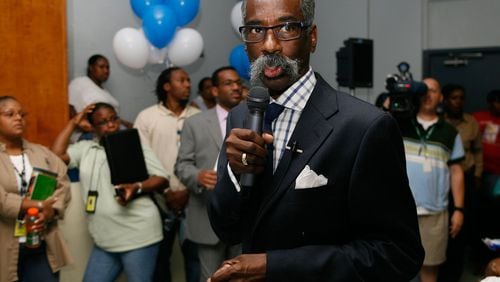Heartbroken.
The Facebook post over a single photo of Barney Simms was simple, but it spoke volumes. Heartbroken is how so many of us feel as we try to make sense of the news that Simms is gone.
Someone shot him, left him dying in the bushes near his home and took off in his car.
And so there was another sentiment repeated over and over Sunday as I engaged members of my beloved Antioch Baptist Church North, where Barney had been a member since 1969.
“This has got to stop.”
Sunday morning, we learned that police had recovered Barney’s car but not his killer and all I could think about was that we’d just talked a week ago in this very place.
It was close to 10 a.m. and I was headed to Sunday school. Barney stopped me and with a big smile on his face informed me that I’d “created a morale problem” in the pastor’s office.
How, I asked him, puzzled.
I’d sent only the pastor a slice of poundcake, Barney informed me.
We laughed and the conversation quickly switched to my work at the AJC, as it often did. An avid reader, Barney almost always offered a critique of my latest column, and on this Sunday he was curious about how I found such diverse subjects to write about.
And always he reminded me that he had once aspired to be a writer, too.
Truth is he was already quite the writer, which made me appreciate our quick conversations between services all the more. Writing is such a subjective craft I found his compliments reaffirming. Now that’s gone, too.
I was surprised to learn he was 70. He certainly didn’t look the part, and when I remember him dancing at one of our last Christmas parties, he didn’t move like it either. That night I saw another side of Barney. Despite his serious exterior, he knew how to have fun. I can still see him doing the electric slide.
He was such an important presence at Antioch for so long, it’s hard to imagine our church family without him on that front pew. He was an active member of Antioch’s trustee board and an adviser to the church’s newsletter staff. That’s how I got the chance to work with him.
Betty Jo Cooke, another newsletter staff member, knew Simms long before I joined Antioch 16 years ago.
She considered him a friend and fellow jazz-lover. He was a regular, for instance, at Clark Atlanta University’s “Jazz Under the Stars,” an annual scholarship fundraiser.
“He possessed many talents, but he was best known for his writing, speaking and flair for dressing,” Cooke said. “He will be missed.”
Barney was also an active member of the Atlanta community, serving as president of his homeowners association, board chair of the Atlanta Victim Assistance and a slew of other organizations.
Brenda J. Muhammad, executive director of Atlanta Victim Assistance, said she hoped Barney’s death is a clarion call to do something about the violence in our community.
Many of us share her sentiment, but the truth is that call should have sounded a long, long time ago. This time, I hope we’ll finally heed it.
Barney wasn't the only African-American male fatally shot Saturday. NFL star Will Smith, just 34, was shot during a confrontation after the vehicle he was traveling in was rear-ended in New Orleans. I would imagine countless others that we don't know about, that didn't have the same stature in the community to warrant a news story died over the weekend, too.
We’ve been hearing a lot over the past few years about police shootings of unarmed black men. Black men accounted for 40 percent of the 60 unarmed deaths, even though they make up just 6 percent of the U.S. population.
It’s a huge problem that still needs our attention. But so does the black-on-black crime that’s plaguing our community. In order for black lives to really matter, black violence has to matter to us, too.
It has got to stop.
If you’re reading this and you feel hopeless to do anything, don’t. Start with a hard, honest talk with yourself and go from there.
None of us has the power to change others, but we can resolve to be better, to do better, to love our neighbor as we love ourselves.
I think that’s what Barney did. He wasn’t a perfect man. None of us are, but he came close in the way he cared about and encouraged others.
He did that for me during every quick encounter we shared at Antioch, and that’s how I will remember him.
Those moments are gone, but I’m reminded of a line I read years ago in an autobiographical essay by my favorite author, James Baldwin.
“Every good-bye ain’t gone.”







